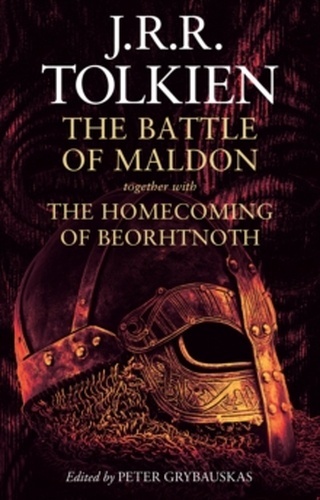The Battle of Maldon

Editorial Harper Collins
Fecha de edición marzo 2023 · Edición nº 1
Idioma inglés
EAN 9780008465827
208 páginas
Libro
encuadernado en tapa dura
Dimensiones 149 mm x 228 mm
Resumen del libro
First ever standalone edition of one of J.R.R. Tolkien's most important poetic dramas, that explores timely themes such as the nature of heroism and chivalry during war, and which features unpublished and never-before-seen texts and drafts. In 991 AD, vikings attacked an Anglo-Saxon defence-force led by their duke, Beorhtnoth, resulting in brutal fighting along the banks of the river Blackwater, near Maldon in Essex.
The attack is widely considered one of the defining conflicts of tenth-century England, due to it being immortalised in the poem, The Battle of Maldon. Written shortly after the battle, the poem now survives only as a 325-line fragment, but its value to today is incalculable, not just as an heroic tale but in vividly expressing the lost language of our ancestors and celebrating ideals of loyalty and friendship. J.R.R.
Tolkien considered The Battle of Maldon 'the last surviving fragment of ancient English heroic minstrelsy'. It would inspire him to compose, during the 1930s, his own dramatic verse-dialogue, The Homecoming of Beorhtnoth Beorhthelm's Son, which imagines the aftermath of the great battle when two of Beorhtnoth's retainers come to retrieve their duke's body. Leading Tolkien scholar, Peter Grybauskas, presents for the very first time J.R.R.
Tolkien's own prose translation of The Battle of Maldon together with the definitive treatment of The Homecoming of Beorhtnoth and its accompanying essays; also included and never before published is Tolkien's bravura lecture, 'The Tradition of Versification in Old English', a wide-ranging essay on the nature of poetic tradition. Illuminated with insightful notes and commentary, he has produced a definitive critical edition of these works, and argues compellingly that, Beowulf excepted, The Battle of Maldon may well have been 'the Old English poem that most influenced Tolkien's fiction', most dramatically within the pages of The Lord of the Rings.
Biografía del autor
John Ronald Reuel Tolkien nació el 3 de enero en Bloemfontein en el Estado Libre de Orange. A principios de 1895, su madre, agotada por el clima, regresó a Inglaterra con Ronald y su hermano pequeño, Hilary. Tras el fallecimiento de su padre, a causa de unas fiebres reumáticas, él y su familia se establecieron brevemente en Sarehole, cerca de Birmingham. Esta hermosa zona rural causó una honda impresión en el joven Ronald, y sus efectos pueden verse en su escritura y en algunos de sus cuadros. Mabel falleció en 1904, y los hijos quedaron a cargo del padre Francis Morgan, un sacerdote del Oratorio de Birmingham. En el King Edwardx{0026} x02019;s School, Ronald desarrolló su amor por las lenguas; más adelante inventaría sus propios idiomas. También por esta época conoció a Edith Bratt, con quien se casó en 1916. Cuando estalló la primera guerra mundial en 1914, Ronald era todavía un estudiante en Oxford. Se graduó al año siguiente, con un sobresaliente en Inglés y poco después fue enrolado como teniente en los Lancashire Fusiliers. En 1916 combatió en la batalla del Somme, pero cayó víctima de la fiebre de las trincheras y fue devuelto a casa como no apto para el servicio. Tolkien fue uno de los mejores filólogos de su época y gran parte de su vida laboral transcurrió en Oxford, primero como profesor de anglosajón y luego como profesor de lengua inglesa y literatura. Al mismo tiempo, en privado, trabajaba en el gran ciclo de mitos y leyendas que más adelante se publicaría con el título de El Silmarillion. Edith y él tuvieron cuatro hijos, y en parte fue para ellos por lo que escribió el cuento El Hobbit, publicado por Allen x{0026}amp; Unwin en 1937. Tuvo tanto éxito que el editor quiso tener en seguida una secuela, pero no fue hasta 1954 que apareció el primer volumen de la obra maestra de Tolkien, El Señor de los Anillos, con un éxito inmediato. Su enorme popularidad sorprendió a Tolkien. Ronald y Edith Tolkien se mudaron a Bournemouth al llegar a la vejez, pero cuando Edith murió en 1971, Tolkien regresó a Oxford. Ronald Tolkien falleció el 2 de septiembre de 1973, tras una breve enfermedad.








